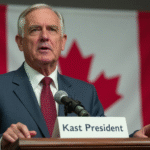Background on Donald Trump and His Influence
Donald Trump, the 45th President of the United States, has been a controversial yet influential figure in American politics. His statements often make headlines, and his recent comments about paracetamol use during pregnancy have sparked debate among medical professionals and the public.
Trump’s Recommendation Against Paracetamol Use
During a press conference at the White House focused on autism, Trump advised women to “avoid taking [paracetamol] as much as possible” due to a supposedly high risk of autism. This recommendation contradicts established medical consensus.
Trump specifically mentioned Tylenol, the most common paracetamol brand in the U.S., which has been widely used for decades without evidence of severe adverse effects.
Context on Autism Prevalence
Trump highlighted the rising prevalence of autism in the U.S., claiming it has grown from “one in 20,000 children” a few decades ago to “one in 31 children” today. This assertion reflects growing concerns about autism diagnoses, though experts emphasize that improved diagnostics have contributed to this perceived increase.
Paracetamol and Pregnancy
Paracetamol is often recommended for pregnant women to manage pain or fever, as alternatives like aspirin and ibuprofen are generally avoided during late pregnancy. Trump’s suggestion to avoid paracetamol has raised concerns among medical professionals, who warn that such advice could cause confusion and fear.
Scientific Perspective on Paracetamol and Autism
The idea of a link between paracetamol use during pregnancy and neurodevelopmental disorders like autism is not new, with mixed research results. A large study of over 2 million children published in 2024 found no such risk. However, a recent analysis of previous studies suggested an opposite conclusion, emphasizing the need for further investigation.
Experts like David Mandell, a psychiatry professor at the University of Pennsylvania, caution against hasty conclusions. They note that distinguishing paracetamol’s effects from reasons for taking it is challenging, as factors like fever can independently increase the risk of developmental delays.
Trump’s Stance on Vaccines and Hepatitis B
Trump also advocated changing the U.S. children’s vaccination schedule, arguing against administering the hepatitis B vaccine to newborns. He claimed there was “no reason” for this, suggesting the vaccine should wait until a child turns 12.
However, hepatitis B can be transmitted from mother to child during pregnancy or birth, making early vaccination crucial for protecting infants.
Key Questions and Answers
- What did Trump say about paracetamol and autism? Trump advised pregnant women to avoid paracetamol due to a supposedly high risk of autism, contradicting established medical consensus.
- Why is Trump’s advice concerning? Medical professionals warn that such advice could cause confusion and fear, as paracetamol is often recommended for managing pain or fever during pregnancy.
- What is the current scientific understanding of paracetamol and autism? Research results are mixed, with some studies finding no link while others suggest a possible association. Experts emphasize the need for further investigation.
- What is Trump’s stance on vaccines and hepatitis B? Trump advocated delaying the hepatitis B vaccine for newborns, despite the risk of mother-to-child transmission during pregnancy or birth.






